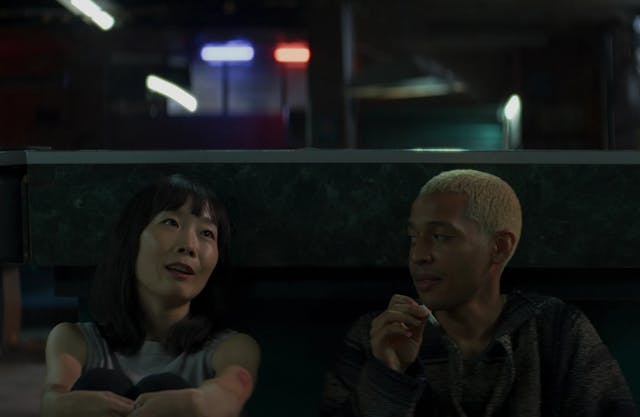
Image from Memoria - NEON
If indie movies darling distributor Neon set out to whip up a controversy announcing their release strategy for Memoria, well, they met their goal. The latest movie from Thai director Apichatpong Weerasethakul will play only in a single theatre at a time, on weekly engagements. Then, it will move to another town throughout the country. There is no use in waiting for view-on-demand availability of a Blu-ray disc. Neon will not release it in those formats. If you do not go to the cinema, you are left out.
A Film With Indie Movies Cred
The stunt seems to fit the film, but it comes at an odd time. On paper, Memoria has the potential to become a crossover hit, or at least, of bringing new audiences to the work of the elusive auteur.
The movie won the Jury Prize at the Cannes Film Festival, and it stars Tilda Swinton. The doyenne of alternative cinema is also not above lending her talents to a commercial blockbuster. She lent indie movies cred to The Chronicles of Narnia franchise (2005 - 2010) as the wily witch and got an Academy Award for playing a conniving lawyer in the George Clooney vehicle Michael Clayton (2007).
By sticking to a modified roadshow model, Neon seems to be squandering an opportunity. Or maybe, they know what they are selling.
A Fixture of Film Festivals
Weerasethakul has been a fixture of film festivals for two decades now. He won a Palm D’Or at Cannes in 2010 with Uncle Boonmee Who Can Recall His Past Lives (2010). His films are contemplative and obtuse, more fit for a museum than a multiplex. Even with a bona fide star attached, it is unlikely that he would achieve significant commercial success. He is the kind of filmmaker who marches at his own rhythm. Marvel is not going to come knocking at his door. He would not open it anyway.
That is the path the Hollywood narrative sets for foreign directors. You do not turn your back on possible film festivals-triumphant indie movies. Once they win a prize or score an unlikely hit in the arthouse, the offers to come to America start pouring in. The idea is tempting. Imagine working with a star, making a killing at the box office, getting an Oscar nomination, and why not, maybe even winning one! This is the path followed by the Mexican trio of Alfonso Cuarón, Guillermo del Toro and Alejandro González Iñárritu. I do not mean to throw shade at the trio. Their talent and temperaments seemed well suited for the American film production industry in a way that Weesathakul is not. By making Memoria hard to see, Neon seems to be renouncing this narrative.
Supremacy of the Theatrical Experience Over Indie Movies Streaming at Home
It makes sense in the way it functions as a statement on the supremacy of the theatrical experience over indie movie streaming at home. The distribution model favoring theatres has been surprisingly resilient, even as the pandemic led Warner Brothers to apply day-and-date theatrical and VOD premieres for his 2021 slate. Since then, they announced a return to the regular distribution dynamic for 2022. The film production industry is keen on preserving this model. Bear in mind that if you want to qualify for Academy Awards consideration, you still need to program your film for at least a one-week run in Los Angeles and New York. Even four-walling a theatre will do if you do not get a distribution deal.

Image from Memoria - NEON
Pushing audiences to the cinema seems the right thing to do for this film. Weerasethakul makes the kind of indie movies that suffer the most in the setting of the modern home. It is full of distractions and electronic devices that demand your attention, just as the movie asks you to slow down and zone into its pace. The immersive possibilities of a dark theatre are a must if you want to enter the particular mood he builds.
Cracks in the Strategy
There are some cracks in the strategy. Neon owns distribution rights for North America only. MUBI, the streaming platform making inroads in theatrical distribution, bought the rights for Germany, Italy, India, and parts of Latin America. Chances are, the movie will be available digitally. Maybe even in physical media, but just not in the United States. The most devoted movie buff know how to get indie movies they want to see. Geographical and technological barriers can not stand in the way. If you have the money, you can get region-free disc players and buy discs online from all over the world. Or you can engage in good old-fashioned piracy. But that is a whole different ethical conundrum.
A Good Strategy for Indie Movies?
At The Reveal substack, critic Scott Adams makes a persuasive argument about how this release strategy works as a lifeline for independent theatres and perhaps your local art house, especially after COVID-19 shutdowns that ate up months of revenue. And yet, as a movie buff who spent his formative years in a country where Hollywood blockbusters were the only game in town, I also hold sympathy for people shut out. We do not live in a major city. We do not have the time or resources to make a trip to catch up with the latest art house films. Or have a health condition that prevents them from going to a theatre. Is casting off this segment of the audience a good strategy for indie movies?
Maybe not in the long run, but regarding this single movie, the announcement did the trick. For a few days, Film Twitter could not talk about anything else. A quick scan of the social media platform will present you with two opposing camps. The first one salutes the effort and points to those who criticize spoiled brats who want everything at hand. On the other side, we have those who lament a model favoring big-city movie buff dwellers living close to the correct art house. Access is a privilege, for good or bad.
And it’s a shame. Memoria has the potential to cross cultural barriers and bring new audiences to the cinema of Weerasethakul. Swinton, who holds the English-speaking world in thrall, tops the cast. But you also have French singer and actress Jeanne Balibar, Spanish-Mexican actor Daniel Jiménez-Cacho, and Colombian talent like Elkin Diaz. All of them work for a Thai director, using funds from Europe and China. It’s a global endeavor destined for a few. Can we decry the dumbing down of movies if we make the challenging, smart ones so hard to see?
Watch “Lonely”
“Lonely” is a powerful reminder that no one is ever truly alone, and there is always someone out there who cares and wants to help.
Stream NowWant to get an email when we publish new content?
Subscribe today




























